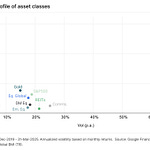Today’s letter is brought to you by Cal.com!
What do I have in common with Chad Hurley (YouTube), Tobi Lütke (Shopify), and Alexis (776/Reddit)?
We are all early investors in Cal.com and we use it instead of Calendly. Cal.com is the leading open-source scheduling platform, which gives you the same superpowers of efficiency previously reserved for elite corporations and tech gurus.
Stop wasting your time with scheduling software that doesn’t work. Use technology to make your life easier.
Cal.com is transforming sophisticated calendar management into an accessible tool for all via a user-friendly interface. Set up is quick, easy, and you will never go back to your boring calendar tool.
Exclusive for Pomp Letter subscribers, use code “POMP” for $500 off when you set your team up with Cal.com. Save time. Save money. Use Cal.com.
To investors,
The United States is in a horrendous economic position. Our country has not had our back up against a wall like this in decades.
Citadel’s Ken Griffin, one of America’s wealthiest investors, was sounding the alarm Thursday in Singapore. His main concerns revolve around inflation and the national debt.
On inflation, Griffin is concerned that the recent rise in de-globalization will lead to a higher baseline of inflation for decades. He pointed out that the Federal Reserve has spent the last 20 years fighting deflationary forces in the economy, which made it difficult for the central bank to hit their 2% inflation target.
Now the organization faces the opposite problem.
The combination of de-globalization and monetization of the national debt provide tailwinds to inflation, which force the central bank to work diligently to suppress CPI as close to 2% as possible.
But our politicians are working against our central bankers. Griffin explained that the government has been spending like drunken sailors and no one was planning on higher nominal and real interest rates when we drove ourselves into a national debt of $33.6 trillion.
How bad is the problem right now?
The United States is officially spending more than $1 trillion on annualized interest payments to service the national debt. That makes it the second largest budget item behind Social Security.
That means we spend more money on interest payments than defense, education, or innovation. Not exactly the situation you want to be in when you are trying to strengthen a country’s financial position.
Add in the fact that Ken Griffin believes interest rates are going to remain higher for the coming years and the outlook becomes even more concerning. This is why Stanley Druckenmiller and others have been vocal about the failure of the government to refinance the national debt at low rates for long durations during the madness of 2020 and 2021.
So what can the government and Federal Reserve do now?
The short answer is nothing easy. One option is for the government to balance the budget, create a surplus, and pay down the debt. This would be the responsible thing to do, yet it seems to be an impossible task at this point. We haven’t run a surplus on the national level since 2001. I wouldn’t hold my breath on this one.
The other option is for the Fed to devalue the dollar in an effort to monetize the debt. Paying down the debt with future dollars that are less valuable has been a strategy long employed by central banks around the world. Unfortunately, this strategy hurts tens of millions of Americans and accelerates the country into a more dire long-term position.
Ken Griffin seems to be worried about this second scenario of debt monetization as well. According to Lulu Yilun Chen and Dexter Low of Bloomberg, Griffin said “the economic consequences would be devastating…the minute we start to print dollars just to deal with the possibility of a default, our economy’s going into a deep tailspin.”
It is not every day that one of the most respected investors in the world is articulating a “deep tailspin” scenario for the United States.
This leads to the question “what can individuals do?”
The answer for individuals is more complex than for the government. Each individual’s situation is different. Young people have a high risk appetite and time is on their side. Older people have the opposite scenario.
I put the options in four major categories:
Eat inflation on the chin
Invest in equities
Invest in hard assets
Buy bitcoin
The first option, eat inflation on the chin, is the biggest one to avoid in my opinion. Official measurements of inflation appear to undercount the true state of the problem, so people who choose to keep 100% of their savings in dollars will likely be harmed much more than they realize.
The other three options are directionally similar—getting out of a devaluing dollar and into an asset that is priced in dollars. As the dollar devalues, the asset prices will increase leading to an increase in purchasing power and wealth.
The decision to buy equities, hard assets, or bitcoin is heavily dependent on an individual’s situation. For me, bitcoin has served as a great option because I can ride the volatility over the long run. Not everyone will be able to do that with a large percentage of their portfolio, but for those who can bitcoin has served as a great asset through a risk-return lens.
Seeing Ken Griffin sounding the alarm about long-term higher inflation and the worsening national debt situation should get everyone’s attention. The problems are not going to fix themselves. Our leadership does not appear to be attempting solutions either. The responsibility has shifted to the individual and family to ensure they are positioning themselves to benefit from inflation, rather than be harmed by it.
My suggestion is to evaluate your options, make decisions, and then continue to monitor the situation. If you are paralyzed with inaction, it will become harder to recover.
Hope you all have a great day. I’ll talk to everyone tomorrow.
-Anthony Pompliano
If you enjoyed this letter, you should consider subscribing to the Pomp Letter. I write 3-5x per week and explain in simple language what is happening in the economy, financial markets, and bitcoin.
Guillermo Rauch is the founder & CEO of Vercel, working on giving developers the frameworks, workflows, and infrastructure to build a faster, more personalized web.
In this conversation, we talk about whether artificial intelligence is going to replace jobs or create more of them, open-source vs closed-source, role of government & regulations, most over-hyped areas vs areas that need more attention, how value will accrue, and what Guillermo is doing with Vercel.
Listen on iTunes: Click here
Listen on Spotify: Click here
Earn Bitcoin by listening on Fountain: Click here
Artificial Intelligence Will Change Everything
Podcast Sponsors
Cal.com - Changing the calendar management game. Use code “POMP” for $500 off when you sign up.
Trust & Will - Estate planning made easy. They are fast, secure, and simple to use. Get your will or trust created today.
Auradine - A new bitcoin miner powered by the world’s first 4 nanometer silicon chip technology.
Base: Base is shaping the future of the on-chain world with near-zero gas fees and rapid transaction speeds.
ResiClub: Your data-driven gateway to the US housing market.*
Bay Area Times: A visual newsletter explaining the latest tech & business news.
You are receiving The Pomp Letter because you either signed up or you attended one of the events that I spoke at. Feel free to unsubscribe if you aren’t finding this valuable. Nothing in this email is intended to serve as financial advice. Do your own research.















Share this post